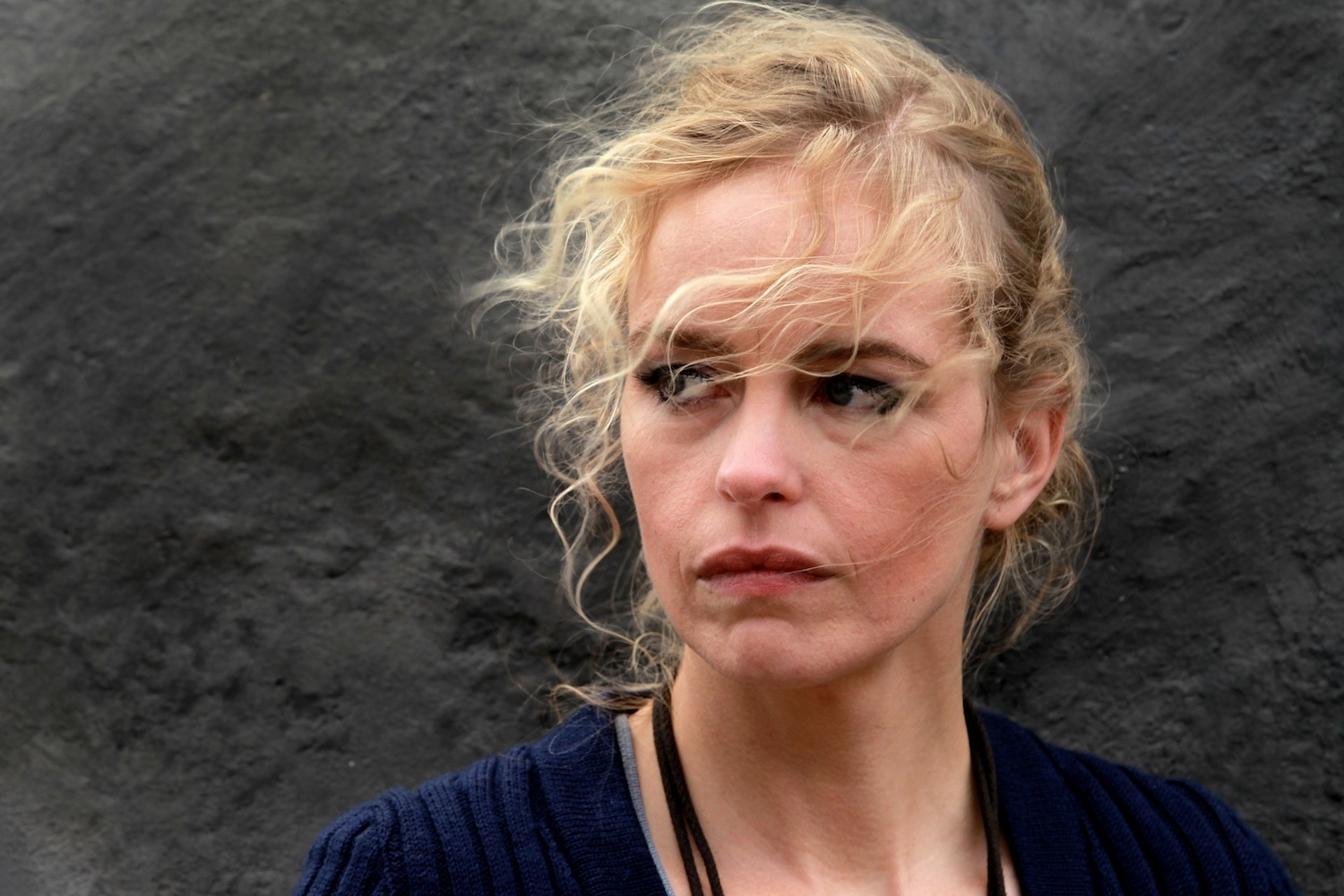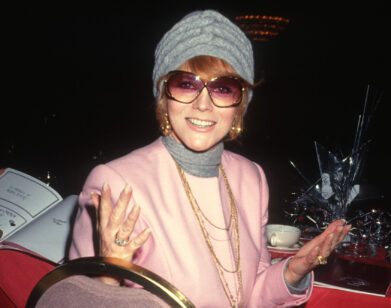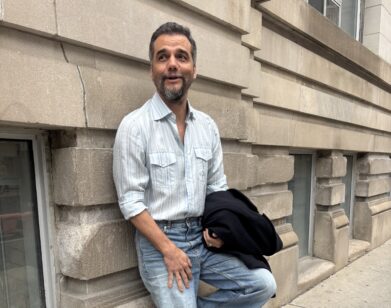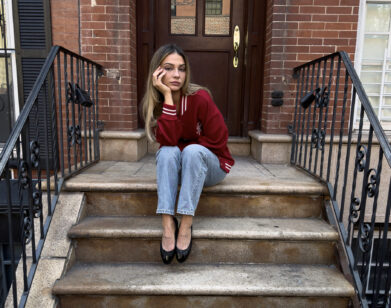Nina Hoss’s Eastern Promises

ABOVE: NINA HOSS AS DR. BARBARA WOLFF, IN CHRISTIAN PETZOLD’S BARBARA, COURTESY OF ADOPT FILMS
German director Christian Petzold (Yella, Jerichow) makes works that negotiate the intersections of political, romantic, and existential entanglements—often invoking, both directly and subtly, his East German roots, and the continual seismic shifts of the identity of his home country.
His latest film, Barbara, set in 1980, featuring regular collaborator Nina Hoss, is a study of the psychology of surveillance, and the rogue mechanics of the self-preservation that accompanies it. Hoss, regarded as one of Germany’s foremost dramatic talents, plays Dr. Barbara Wolff, a gifted young pediatrician who, as punishment for applying for an exit visa from the GDR, has been transferred from her post in Berlin to a small hospital in the East German provinces. Subject to constant scrutiny by local Stasi officers and a legion of unidentified informants, Barbara turns her attentions inwards, constantly wary of those who surround her, plotting an escape to meet her lover in the West.
Rather than creating a drab portrait of romanticized Eastern Bloc listlessness, Petzold instead crafts the constricted reality of a life lived in constant paranoia, incongruously matched with the feral beauty of the East German countryside. Hoss navigates Barbara’s mental state with a measured steeliness that subsides only when Barbara is at work, where her dedication, and sensitivity, to her patients takes precedence. Despite her suspicions as to his allegiances, Barbara develops a hesitant rapport with a colleague, André (Ronald Zehrfeld), who seems to share her passions as fiercely as she does. The tension between them manifests romantically, leaving Barbara uncertain of her future plans.
We spoke with Hoss last week, not long after she’d wrapped production on her first English language feature, the John le Carré thriller A Most Wanted Man, alongside Phillip Seymour Hoffman, Willem Dafoe, and Rachel McAdams.
COLLEEN KELSEY: This is the fifth film that you and Christian have done together. How has your relationship grown as you’ve continued to collaborate on these projects?
NINA HOSS: We really have a close friendship, you know, which means we can be more frank and open towards each other, always with total respect. But, we push each other a bit further and further always, and we’re always still curious about each other. And when he talks about a story he’s thinking of doing, then the whole process is so special because I’m involved in a very early stage and I have the feeling I can, and not only, influence anything about my character, but about the whole story that my character’s in. That is an amazing experience, because we know whenever we criticize each other, it’s for the best, and you don’t find that very often, that you trust each other so much. That’s a special thing.
KELSEY: Especially coming from an American background—there’s such a mystique about the Communist state. You grew up in West Germany. What was your perception of the GDR when you were growing up?
HOSS: I was 14 when the wall came down, so I only ever knew about the GDR or experienced it as a kid. I lived very far away from it, and you only ever thought about the GDR when you saw the Olympics, because you were like, “How are they always winning?!” [laughs] Other than that, it was really closed, and unless you had family, then you had a reason, but since we didn’t, then I never went. I didn’t understand the concept that there’s a state that won’t allow its people to leave or come back whenever they want to, by saying, “It’s because we love you.” And I never get that—I still don’t get that concept. I thought, that’s very threatening, and I don’t get why you would want to make this experiment.
So I was very interested in it. I always thought, “That won’t work,” but I understood the longing that they were looking for, the equality, and is it possible for people to live like that together? Obviously not. In 1995, I went to Berlin to acting school, which was in East Berlin. And I decided to live in the east, because I thought if I go to West Berlin, I might as well stay in Stuttgart in the West because I know all the signs, and the way we deal with each other, and I wanted to get to know the other part of Germany and how they lived and what their history was and their biography. In that period of time, I learned a lot, and it helped me a lot for portraying Barbara, because I was very sensitized for what went on inside of them. Obviously, the first thing was that they were happy that they were experiencing democracy now, and having the freedom to go wherever and express your thoughts without being threatened. So, that’s something they are deeply thankful for, I’m sure, but the problem was that no one asked anything. The West just went, “Then you must be happy now, God, what a horrible life you must’ve had!” Of course, they had children, they fell in love, and the grass was green and the wind was blowing. It’s 40 years. It’s a generation. There was a big wave of nostalgia, we call it “Eastalgia,” where they said it was not always bad.
Now, after we went through all that, now we can actually talk, and this movie’s out. I think it helped us with Christian having strong relations to the GDR, and remembering things about it, and the smell, and the atmosphere. But, having this distant view on it makes us more realistic about things.
KELSEY: The film’s a period piece, but it’s not so far away in the past—how much research and preparation did you do in terms of the details?
HOSS: Mainly I got to know about the atmosphere and how people felt, because I never experienced it physically. You can’t talk, because everywhere there’s someone listening in on everything you say, and you might get things wrong and be questioned or they come up and say, “Well, actually, we want you to work for us and if don’t, we’ll pressure you,” and stuff like that. Living in a country like that, how do you get around it and still keep your dignity? I think it’s one of the main questions. If you see something’s wrong and you can’t do anything against it, but you have the knowledge of it, you’re being torn apart. So I talked to loads of people, which was a big part of my preparation, and I read a lot of books.
KELSEY: And I read that Christian had you guys watch the Howard Hawks movie, To Have and Have Not, with Humphrey Bogart and Lauren Bacall.
HOSS: Yes. Klute, too. And we always do that. First of all, if everyone’s there watching movies and then later on you talk about it, it always has a bonding effect. You know, you’re already in a good mood, you’ve discussed things, you learn a lot about how people see things and what they’re interested in. And of course, as actors, you learn what he [Petzold]’s interested in and how he sees things and the aesthetic he likes. And with Howard Hawks, it was mainly about how these two, Humphrey Bogart and Lauren Bacall, flirt, because it’s kind of cocky and harsh even, sometimes, but underneath that, it’s always testing the other person. And because that other person can handle it, you fall in love, because there’s a partner, and it was all on the same level. And that’s what Barbara and André do. She is testing him constantly, and he’s always able to deliver.
KELSEY: What’s interesting about them is in addition to the tension, it’s very much what is unsaid is what they’re saying. It’s always right below the surface. Why do you think she’s so attracted to him?
HOSS: Christian was always talking about how he wants to make a movie where the main difference is, the GDR people found love at the workplace, and the West is always telling stories about finding love when work is over and you have your free time and your leisure time. That’s when you fall in love. But in the Communist state, you fall in love in the workplace, because that’s mainly where you are. And so for me, it was very clear that she finds a partner—in comparison to the Western lover—who knows exactly what her passion is and he’s as passionate for the same thing. Then it’s someone who has the same interests, who is reading, who is thinking about paintings, and maybe interested in philosophy, as well. He allows himself to think bigger than the GDR wanted him to. And then, the main thing I think is, the work—that he’s as passionate for it as she is. And that he can handle her, he won’t back down. He doesn’t get nasty, he just always knows to say the right thing at the right time.
KELSEY: You see that there are two motivations for Barbara in the movie. One, obviously, is that her plan is to plot her escape. But, then you see her obligation to her work, and when the patient Stella comes, it intensifies. She does make a sacrifice at the end, but do you think it’s because she realizes that she believes in cultivating a relationship with André, or that she’s prioritizing her duties as a doctor?
HOSS: Well, I think it’s not so clear. I think it’s a combination of things. Because at this moment, she has an option. Now she’s not on her own. I wasn’t convinced, really, that she can trust André, but she decides to, and that’s a freedom of choice, so there’s a sort of freedom in that. Because she feels now, “I have somehow, I can manage to live in this country.” He can cook things, and he fights for his passions—also, it’s not so easy to leave your home, to leave everything behind knowing that you might eventually never come back. And then having a young girl being pregnant, and knowing that her future is definitely gloom, and yours can be much better than hers—that’s the heroine.
KELSEY: It’s very unclear. There is a possibility that André might not be as honorable as he seems. When you were in preparation for the role, did Ronald ever reveal André’s motivation, or did you keep it ambiguous?
HOSS: Well, if you know Ronald, he can’t ever imagine that he’s not real. So, for him it was clear that there was nothing happening with him. But I was torn as an actress and as Barbara because of the answers he’s giving. I think she never felt that this is possible. I think she felt she had to be this closed-up person as we get to know her, because that’s the only way you can survive and not let anyone touch you anymore or get to you. And now she sees, “No, it’s possible.”
BARBARA IS OUT IN LIMITED RELEASE TOMORROW, DECEMBER 21.






